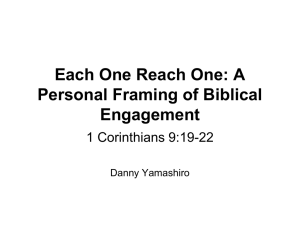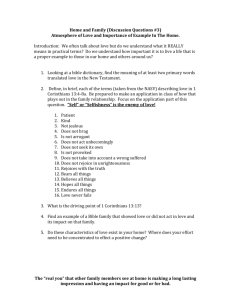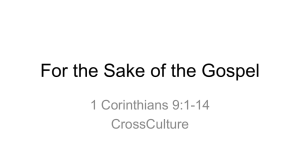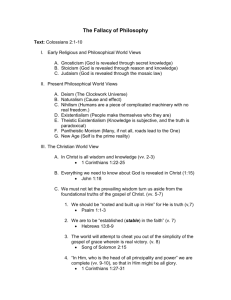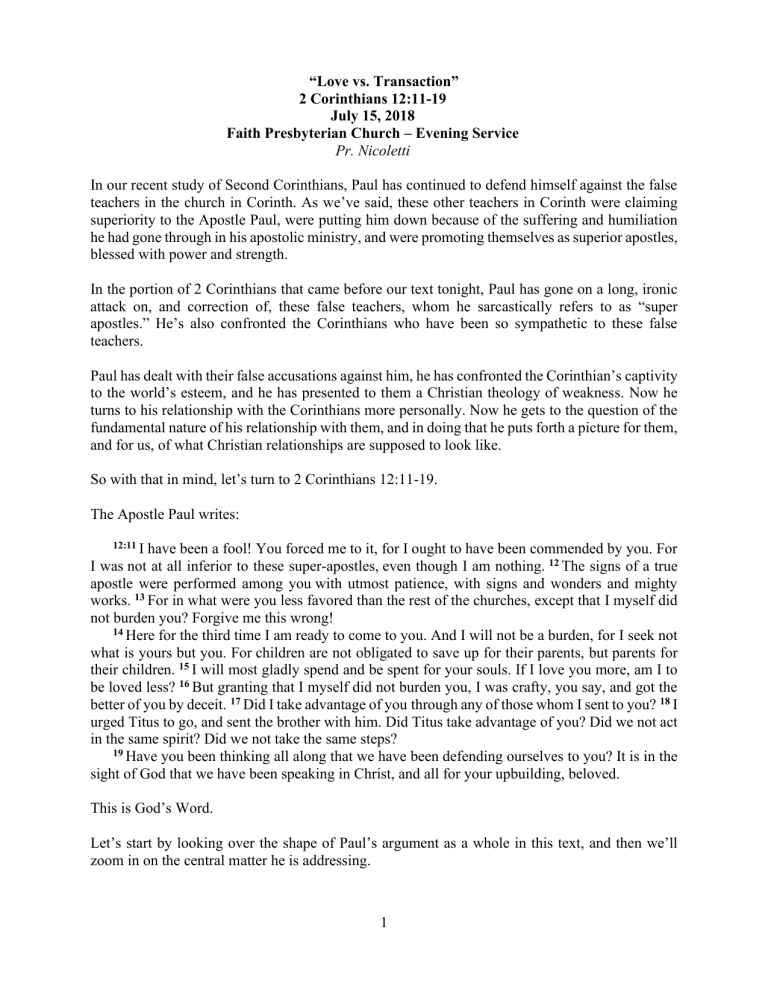
“Love vs. Transaction” 2 Corinthians 12:11-19 July 15, 2018 Faith Presbyterian Church – Evening Service Pr. Nicoletti In our recent study of Second Corinthians, Paul has continued to defend himself against the false teachers in the church in Corinth. As we’ve said, these other teachers in Corinth were claiming superiority to the Apostle Paul, were putting him down because of the suffering and humiliation he had gone through in his apostolic ministry, and were promoting themselves as superior apostles, blessed with power and strength. In the portion of 2 Corinthians that came before our text tonight, Paul has gone on a long, ironic attack on, and correction of, these false teachers, whom he sarcastically refers to as “super apostles.” He’s also confronted the Corinthians who have been so sympathetic to these false teachers. Paul has dealt with their false accusations against him, he has confronted the Corinthian’s captivity to the world’s esteem, and he has presented to them a Christian theology of weakness. Now he turns to his relationship with the Corinthians more personally. Now he gets to the question of the fundamental nature of his relationship with them, and in doing that he puts forth a picture for them, and for us, of what Christian relationships are supposed to look like. So with that in mind, let’s turn to 2 Corinthians 12:11-19. The Apostle Paul writes: 12:11 I have been a fool! You forced me to it, for I ought to have been commended by you. For I was not at all inferior to these super-apostles, even though I am nothing. 12 The signs of a true apostle were performed among you with utmost patience, with signs and wonders and mighty works. 13 For in what were you less favored than the rest of the churches, except that I myself did not burden you? Forgive me this wrong! 14 Here for the third time I am ready to come to you. And I will not be a burden, for I seek not what is yours but you. For children are not obligated to save up for their parents, but parents for their children. 15 I will most gladly spend and be spent for your souls. If I love you more, am I to be loved less? 16 But granting that I myself did not burden you, I was crafty, you say, and got the better of you by deceit. 17 Did I take advantage of you through any of those whom I sent to you? 18 I urged Titus to go, and sent the brother with him. Did Titus take advantage of you? Did we not act in the same spirit? Did we not take the same steps? 19 Have you been thinking all along that we have been defending ourselves to you? It is in the sight of God that we have been speaking in Christ, and all for your upbuilding, beloved. This is God’s Word. Let’s start by looking over the shape of Paul’s argument as a whole in this text, and then we’ll zoom in on the central matter he is addressing. 1 In verses 11-13 Paul reproaches the Corinthians for making him defend himself. He reminds them of what he has done for them, what they have seen in his ministry. He confronts them with the fact that they should have commended him to the false teachers, rather than forcing him to commend himself to them. He puts before them a reminder that the only thing he seems to be guilty of is not taking their money, and he ends the thought again with sarcasm, ironically asking them to forgive him this wrong of not being a financial burden to them. We can read this first paragraph as if Paul is a polemicist, primarily making an argument, but I’m not convinced that that is the best way to hear him, especially based on what follows. Paul is about to talk about his love for the Corinthians. But they have returned his love with suspicion and false accusations, when they should have trusted him and loved him in return – they should have defended him. There is a reproachful, disappointed, even hurt tone behind these verses. Paul really loved these people. And they had not loved him in return, despite all he had done for them. We see all that in verses 11-13. [Barnett, 577-582] Let’s jump from there down to verses 16-18. Here Paul deals with the accusations that some had apparently made that while Paul publicly refused their money, he was secretly getting his hands on their money through his associates – his partners in ministry. The idea is that Paul had been pretending not to take their money, but was using Titus and others to get money from them that would then be funneled to Paul. Paul here identifies the accusation, which was maybe more being implied or gossiped about than made directly, and he challenges them to make the accusation plainly. Apparently Paul was confident enough in not only his own conduct, but also the conduct of Titus and his other co-workers, that he was happy to challenge anyone to make a direct accusation, knowing they could not convincingly do so. [Barnett, 583, 586-587] Some false accusations can only thrive in the darkness of gossip. Paul forces this one out into the light, where it withers upon closer inspection. And then in verse 19 Paul explains to them why he has given the extended explanation of his ministry that he has, over the previous chapters. It has not been for his own benefit – it has all been for them, for their sake, for their upbuilding. Paul’s primary concern is that the Corinthians know Christ, and reject false versions of Christ’s gospel. Paul is willing to patiently and persistently carry on this dispute with the Corinthians not because he personally needs something from them, but because he cares for them, and wants them to walk in the truth. He’s urging them to reject the false teachers and follow the gospel he has preached to them, not so he can personally benefit from them, but so that they can benefit from him – so that they might imitate him as he imitates Christ, rather than imitating the false teachers as they walk in a way contrary to the gospel of Jesus. Paul in this text is explaining his relationship to the Corinthians, and his love for them. He’s not looking to gain from them, but to love and serve them, and even though they have hurt him and failed to love him in return, his chief concern is still to work for their upbuilding in their relationship with Christ. And the heart of that theme is found in verses 14 and 15. To really feel the force of these verses, we need to think about why the Corinthians have been so upset about Paul not taking their money. 2 That has been a theme that keeps coming up in 2 Corinthians. The Corinthians wanted to give Paul money, Paul refused, and the Corinthians are upset about it. Why is this issue so important to each of them? Well, the Corinthians were used to relating to teachers in a client-patron relationship. The structure of the relationship was that they provided for the needs of their teacher, and the teacher provided teaching for them. It was a fundamentally transactional relationship – each entered the relationship for their own benefit. [Barnett, 583] It’s worth analyzing that a bit further. Polish philosopher Karol Wojtyla contrasts a utilitarian approach to relationships and a loving approach to relationships in the first part of his work Love and Responsibility. [See Wojtyla, 1-28; Waldstein 23-34 for some of the basis of what follows.] And Wojtyla analyzes utilitarian relationships like this – they are relationships we enter into where we are primarily concerned about our own benefit, and where the other person is used almost like a tool, as a means to our own end. In other words, we reduce them, we use them, to get something else that we value more than we value them. And we can structure relationships with others on that basis – if it is a relationship where each of our self-centered goals can be harmonized for mutual benefit. So we each agree to use each other to get something that we value more than the other person. Wojtyla speaks of this as “harmonized” “egoism.” [Wojtyla, 23] We might more descriptively refer to it as a “self-serving, person-using transaction.” It is “self-serving” – our primary goal is benefiting ourselves, not someone else. It is “personusing” – the person we interact with is not the goal or the end of the relationship, they are a tool we use to get something else. And it’s a “transaction” – we enter a transaction where we agree to use each other to meet our own goals, because it just so happens that each of our self-serving goals lines up in such a way that we can each benefit from agreeing to use each other. So it is a selfserving, person-using transaction. It’s all agreed, it’s mutually beneficial, fully consensual. But in it, each person is chiefly looking out for themselves. Wojtyla makes the point that this kind of relationship can sometimes look like a loving relationship. It can even be referred to as a loving relationship by people. But it’s not. It’s about benefiting oneself. And the moment the relationship is no longer beneficial for the personal interests of one of the individuals in it, there’s no reason for them to continue with the relationship. Self-serving, person-using transactions. And that’s basically the kind of relationship the Corinthians wanted to have with Paul. They had money. He had teaching. Why not set up a mutually-beneficial transaction? And Paul refuses. Now we’ve said this before, but Paul’s refusal is not because he thinks it’s inherently wrong for ministers to be paid by those they minister to – in other places Paul argues strongly for that principle. In one way, it had to do with the nature of his own ministry as an Apostle. But it also seemed to be something Paul was even more concerned about with the Corinthians in particular. He seems to feel that they had an especially flawed understanding of what it would mean to financially support him. They would have seen such a relationship not as loving mutual support, but as a transaction – a self-serving, person-using transaction – and so Paul refuses. 3 He lays out what his relationship is actually like to them in verses 14 and 15. Let’s look at those again: Paul writes: “14 Here for the third time I am ready to come to you. And I will not be a burden, for I seek not what is yours but you. For children are not obligated to save up for their parents, but parents for their children. 15 I will most gladly spend and be spent for your souls. If I love you more, am I to be loved less?” What is Paul saying here? First, he says that his relationship to them is one of love, not transaction – he says that at the end of verse 15. What then does that loving relationship look like? In the first half of verse 15 he says that it is one where he not only spends what is his, but he spends his very self – he pours himself out for them, as he says somewhere else (Phil 2:17). So Paul spends himself, but that is not all he says. There is also the question of what he is seeking, if it’s not his own benefit. And he tells us that in verse 14: he is seeking not what is theirs – not what he can get from them – but he is seeking them themselves. That is what love looks like. Karol Wojtyla describes this as a relationship in which we give ourselves as a gift to the other person, while seeking them, as a person, and their good, above other things. We might refer to it, in contrast with “self-serving, person-using transactions,” as “self-giving, person-seeking love.” First, it’s “self-giving” – it’s willing to spend and be spent, willing to pour out not just one’s possessions, but one’s very self. Second, it’s “person-seeking” – it seeks not what it can get from other people, but it seeks the person as being more valuable than anything one might get from them. And third, it is “love.” It’s not a transaction, but it is love in the Biblical Christian sense. “Self-giving, person-seeking love.” That is the kind of relationship Paul says is right between him and the Corinthians. Far from being like the way a client relates to their patron, he says it is more like the way a father relates to his child. [Barnett, 585-586] And Paul wasn’t making up this model of self-giving, person-seeking love. It finds its root and foundation not only in the gospel, but in the nature of God. God, the Christian Scriptures teach, is a Trinity: three persons united as one God. And those three persons are not static. As helpful as our diagrams are, they are not like our diagrams. They are constantly and eternally interacting. Emily Stimpson puts it like this – she says: “We know from divine Revelation that God isn’t a Person. He’s Three Persons. […] [A]s Father, Son, and Holy Spirit, God is a communion of love. The Father pours out His love totally and completely to the Son. The Son receives that love and pours it right back, eternally and completely, to the Father. And that love is so complete, containing everything both Father and Son have and are, that it too is a person, the Holy Spirit.” We can of 4 course add that the Spirit pours out his love completely to the Father and the Son, and the process continues, round and round. [Stimpson, 32] In other words, the nature of the Triune God is each person of the Trinity living in a self-giving, person-seeking, loving relationship with the other persons of the Trinity. Father, Son, and Holy Spirit give themselves as gifts to the other persons, not because they are seeking something else from them, but because they are seeking them. And as each person does this, God is a communion, a community of love. Love, the kind of love Paul is talking about, finds its foundation, its root, its form in the nature of God – the God who is love. And that same love is shown in how God relates to his people in the gospel. The gospel is a picture of God extending that self-giving, person-seeking love of the Trinity to us, even as we are in our sin. God does not send some other creature to save us, he doesn’t give something to save us, but he gives his very self. In Jesus Christ God gives himself in love. And he does it not to get something from us, but so that he might have us. We are what he seeks. The gospel is the self-giving, personseeking love of God extended to sinners. And we even see it in our future hope. The picture of eternity for God and his people is described in Revelation 21 with the words, “Behold, the dwelling place of God is with man. He will dwell with them, and they will be his people, and God himself will be with them as their God.” [Rev. 21:3] The picture of paradise for all eternity is God giving himself to his people, while his people give themselves to God, in love, for all eternity. That is why it was so important to Paul that this be his relationship to the Corinthians. He was not being stubborn or obstinate when he refused their money. He knew what they would think of their relationship to him the minute he took their money: that this was a self-serving, person-using transaction of mutual benefit. But that is not the gospel. The gospel is self-giving, person-seeking love. And Paul was determined that he would not just preach the gospel to the Corinthians with his words, but he would also preach it by his deeds. And to do that, his relationship with them had to be one of self-giving, person-seeking love, and he had to avoid any possibility that they might think of it differently. And we are called to the same thing. We are called to the same thing in a myriad of relationships – to reflect the nature of God, to reflect the heart of Christ, to show forth the pattern of the gospel, by relating to others in self-giving, person-seeking love. We know that, a lot of the time. But we’re not very good at it. The truth is that we very easily slip into the pattern of the Corinthians. Transactional relationships are easier. And sometimes we prefer them, even when we shouldn’t. But they are not our greatest good. They are not what our Lord calls us to. He has something much higher, much more noble, much more beautiful for us – relationships that don’t just meet our needs, but that reflect the very nature of God. Paul sacrificed much to live out such relationships. And with that he calls us to do the same – to follow in the footprints of our Lord and to live lives characterized by self-giving, person-seeking love. 5 What does that look like? Let’s consider a few relationships together. Perhaps the easiest to begin with is marriage. Marriages can easily slip into a transactional mode. And it can be easy to miss, because it might not be the actions themselves that change, but the way they are thought of. The division of labor in a household, whether dividing household chores, or dividing child care and income-producing work, or anything else, can all be expressions of love. But the same actions can also become transactional. The way to tell where your heart is at, is to see how you react when you, whether in the grand scheme of things, or even just in one narrow instance, feel like you’re putting into your marriage or your spouse more then you’re getting out of it or them. How do you feel then? How do you feel when your husband or wife requires more of you than they are able to give to you? How do you feel when your marriage feels that way for a day? What about a week? Or a month? Or a year? Or decades? How do you feel when something about them or their lives holds you back rather than propels you forward? I think most of us get angry. And when we do, it reveals something about the way we think about our marriages. We may never consciously think it, and we hopefully would never say it, but we often act as if our marriage is a self-serving, person-using transaction of mutual benefit. Our anger, when the cost of our marriage seems to be more than the benefit, reveals the way we think of it in our hearts. A conscious acceptance of that way of thinking about relationships is what lies at the foundation of our culture’s increasing embrace of serial monogamy. Romantic and sexual relationships become temporary alliances, that last as long as both people feel it benefits them. The hook-up culture takes that same line of thinking one step further. Individual interactions can be assessed on a transactional basis. If they are mutually beneficial, then why not? But the fundamental nature of the relationship is self-serving use of the other person. People agreeing to mutually use each other. The Christian sexual ethic is not an arbitrary restriction of sexual expression and enjoyment. The Christian sexual ethic is a demand that no human being ever be used sexually as a mere tool, a mere means to an end – even if they consent to be used that way, even if it’s in exchange for their equal ability to use the other person that way. In the Christian understanding, not even the other person’s consent gives you the right to use them – to treat them as a mere means to an end in that way. The Christian sexual ethic demands that sex be self-giving and person-seeking. That means it cannot only be giving someone use of your body in exchange for use of their body – but you must give them your very self, your body, your heart, your possessions, your familial loyalty, your present, and your future. And not just for as long as it’s beneficial to you, but for the rest of your life. That is why the vows are “for better for worse, for richer for poorer, in sickness and in health, to love and to cherish, till death us do part”. It’s a total self-giving. And what it seeks is the other person – not something from the other person, not just a part of the other person, not just a season in the life of the other person. To be truly person-seeking love, it 6 must be all of it – the whole person, not just now, but always. That is self-giving, person-seeking love. It is a beautiful thing. We know that when we see it. Married Christians, how do you need to grow in this in your marriage? How have you treated or thought of your spouse transactionally? How have you been more interested in what they can give you, rather than in them themselves? And what would it look like to pursue the beauty of love as Paul puts it before us – to pursue your spouse in a way that says to them, “I seek not what is yours but you”? We can ask similar questions about relationships between parents and children. Here again, it’s easy to slip into a transactional mode, and it often takes this form: the parents require some kind of outward obedience or conformity, and in exchange the parents leave their kids alone in other areas. They don’t probe any deeper. And a certain level of peace can be maintained that way. But it’s a peace from a mutually-beneficial, self-serving transaction, not from person-seeking love. Now that is not to say that outward obedience is not important – it is. But it’s important as part of a larger whole. By itself its value is a lot lower. This can happen for those of us with young children when our focus is exclusively on their outward conformity, and discipline and consequences no longer become a tool to shepherd their hearts, but a transactional tool. They obey to avoid negative consequences, it brings a level of peace, and we stop there. There might be peace there, but that’s not self-giving, person-seeking love. Such love requires parents to seek to know their kids – to be satisfied not just with outward obedience, but to want to know, out of loving concern and interest, what is really going on in their kids’ hearts and minds. It’s not satisfied with outward peace – in fact it’s willing to sacrifice outward peace for a real, personal, heart-level relationship with one’s children, because the child is more important than the quiet. And the same dynamic can be at play with older children, with adolescents and teenagers. A transaction is reached. The teen behaves the right way in the right settings, and then no questions are asked about what they do in private. The teen sits through the right church services and Sunday school classes and then no real meaningful questions are asked about what the teen really thinks or believes – about how they feel about what they are being taught. We can pursue external conformity and reward them by leaving them alone. It is hard to know our teens. They can be pretty avoidant – believe me, I know. But we should persist. We should persist and be a pain in the neck if we have to be – not because we want to make sure their conformity is consistent and that there are not chinks in their behavior, but because we want to know them. We want to know their hopes and dreams. We want to know their fears and anxieties. We want to know their beliefs and doubts. We want to help them wrestle with their faith, rather than demand that they give the right answer externally. That is what self-giving, person-seeking love looks like. 7 This extends to friendships as well. Michael Brendan Dougherty – whom I seem to be on a kick with; I quoted him a few weeks ago – had an article this week on what he calls declining “social treasury” in our country. He writes: “There is a paradox afflicting our politics. […] It’s the contrast between increasing standards of living and increased social anxiety and unhappiness. You notice it in the headlines every day. By the normal measures, the economy is roaring. Unemployment continues to dive. Wages are starting to creep up. The market is frothing. And yet as all these trends have gone in the right direction, your friends and neighbors insist that things are getting worse in America. “The U.S. keeps slipping in rankings of its self-reported happiness. The Sustainable Development Solutions Network, which is a United Nations initiative, explained the slide in rankings by noting that ‘social support networks in the U.S. have weakened over time.’” “Social support networks in the U.S. have weakened over time.” What does that mean? Well, it means that most people in our culture have fewer and fewer people they can rely on. Marriage rates are declining, family size is shrinking. But it’s not just that. Dougherty goes on: “Other surveys show massive increases in loneliness, with progressive generational declines in the art of friendship. On average, Americans have one fewer close friend today than a generation ago. Many men report having no close friendships. The youngest Americans, the ones using social media the most, are [also] socializing the least [in real life].” Dougherty goes on to point out that even for the elites in our culture, those who tend to have a wide network of social connections, that network is more and more a network of favor-trading than it is a network of loyalties and responsibilities – we might say that those networks are more and more networks of transactions, rather than of love. Dougherty suggests that this trend may actually be what is behind the increases in both nationalism and socialism in our politics. Increasingly lonely Americans feel they have fewer who have a sense of loyal duty to them, fewer who will help them share the burdens they face in life. On a gut level there would be an emotional draw to Nationalism, which emphasizes our duties to one another, and towards socialism, which emphasizes shared burdens. When family or friends or other people on social media make passionate appeals for either hypernationalism, or for state-run socialism, we can easily respond with arguments about economic and political theory. But what if politics isn’t really the issue most of the time? What if the person is really just lonely, and looking for something that will unite them in a deeper way to others? We are a culture where our social connections more and more resemble transactions. Fewer and fewer friendships are characterized by self-giving, person-seeking love. Brothers and sisters, we Christians should be much better at friendship than we are. Perhaps, as people living in this culture, one of the greatest signs of the gospel working in our hearts and shaping the pattern of our lives will be us pursuing these kinds of friendships: friendships that get below the surface. Friendships that involve commitment. Friendships that seek not what we can gain from the other person – but that seek the other person themselves. Such friendships are hard 8 work. They require self-giving. But they are what we are designed for as human beings made in the image of a self-giving Triune God. This pattern of self-giving, person-seeking love should play out in our marriages, our parenting relationships, our friendships. It should also play out in our church – particularly in how we relate to those we minister to. I’m so excited for our Isaiah 58 ministries. I’m excited for our growing passion to minister to the local needs around us – to love our neighbors in tangible ways. I’m excited by our increasing desire to bring healing to those in our reach. I’m excited for us to grow and expand that kind of kingdom work in the months and years ahead. But one thing we must be careful about as we do such work is to make sure that it is an extension of the kind of love Paul talks about here. We have to be willing to spend ourselves on this kind of work. We have to be willing to seek not just things from those we serve (whether it’s their approval, their thanks, or even their conversion), but we need to seek them. We need to see them and care for them as persons, not projects. A person knows when they are being treated as a project. And they know that such treatment, even if it meets their felt needs, still dehumanizes them a little bit – because the person serving them is not really seeking them, but a notch in their good-works belt. Faith Presbyterian Church, let us spend and be spent as a congregation serving those around us – preaching the gospel by our deeds, showing the mercy of the kingdom of the Christ by what we do. But let us always be sure we are serving people made in God’s image first – recognizing their dignity and desiring to know them, and not treating them as a means to an end, a project for us to complete. Finally, this pattern of love should push us to reflect on our relationship to God. I think we far too often treat our relationship to God as a transaction. We give faith and obedience and maybe our tithe, and God gives us heaven, and hopefully a relatively enjoyable and non-tragic life between now and then. But Paul’s pattern of love points to Christ’s – it points to God’s. And it reminds us that God is more interested in you than in your obedience. God is more interested in you than in your doctrine. He’s more interested in you than in your tithe. That doesn’t mean that those things don’t matter – they do matter! But as we said this morning, they are to be expressions of a loving relationship, not items in a transaction. Our default is to try to relate to God transactionally. But he has not related to us like that. He has given himself, not just his things. He has shared his person with us, not just a set of spiritual benefits. He loves us with a self-giving, person-seeking love. Will we seek to love him in the same way? Or, like the Corinthians, will we try to make it a transaction? If we do try to make it a transaction, then, like Paul, God will resist us. It is scary to really give ourselves to God – to reveal our heart to him in prayer, to seek his heart in Scripture, to focus on him as a person rather than as an idea in worship. But that is what the gospel is. Paul implies in 2 Corinthians that our relationships reflect our view of the gospel. The false teachers sought out transactional relationships because they had a transactional view of the gospel. 9 Paul sought out self-giving, person-seeking loving relationships because that is how he viewed the gospel. We are all preaching by our deeds, by how we relate to those God has placed in our lives. The question is not if we are preaching, but what we are preaching. Will we preach a false selfinterested transactional gospel, or a self-giving gospel of love? What will we preach to our spouse? What will we preach to our kids? What will we preach to our friends? What will we preach to those we minister to? What will we preach through our relationship with God? We possess the priceless pearl of the gospel. Christ has shown us the beauty of holiness. By his spirit, may we lovingly give ourselves to the people God has placed in our lives – seeking not what is theirs, but them. Amen. --This sermon draws on material from: Barnett, Paul. The Second Epistle to the Corinthians. NICNT. Grand Rapids, MI: Eerdmans, 1997. Dougherty, Michael Brendan. “The Social Treasury Is Depleting.” July 6, 2018. NationalReview.com. (https://www.nationalreview.com/2018/07/social-treasury-ofamerica-is-depleting/) Stimpson, Emily. These Beautiful Bones: An Everyday Theology of the Body. Stueubenville, OH: Emmaus Road Publishing, 2013. Waldstein, Michael. “Introduction” to Man and Woman He Created Them: A Theology of The Body by John Paul II. Boston, MA: Pauline, 2006. Wojtyla, Karol. Love and Responsibility. Boston, MA: Pauline, 2013. Wright, N.T. Paul for Everyone: 2 Corinthians. Louisville, KY: Westminster John Knox, 2004. 10
